Politics
US allies’ embrace of Palestinian statehood tests Trump’s Israel policy
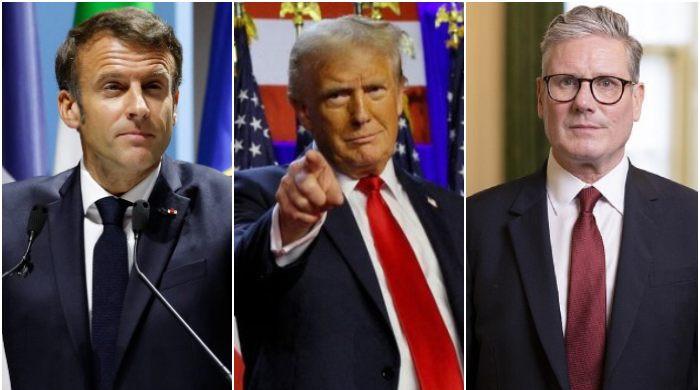
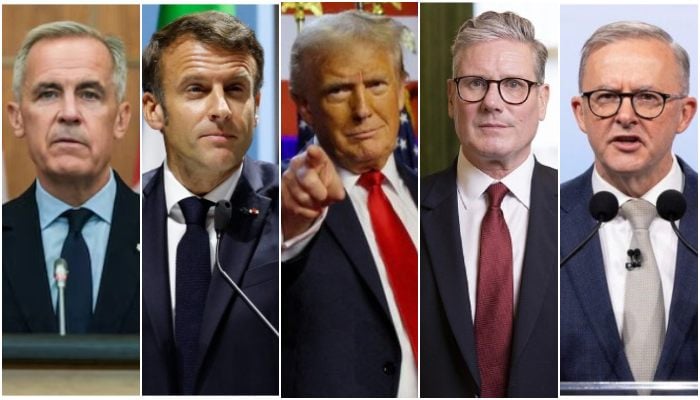
Growing international frustration with Washington over the war in Gaza spilled into the open at the UN General Assembly this week, with US allies recognising a Palestinian state in a major test for President Donald Trump’s Middle East policy.
After promising at the start of his second term to quickly end the war between Israel and Hamas, Trump now looks increasingly like a bystander as Israeli forces escalate their onslaught in the Palestinian enclave and he remains reluctant to rein in Washington’s closest regional ally.
Israeli Prime Minister Benjamin Netanyahu blindsided Trump with a strike on Hamas leaders in Qatar earlier this month that all but doomed the Trump administration’s latest effort to secure a Gaza ceasefire and hostage-release deal.
Israel since then has launched a ground assault in Gaza City that the US accepted without objection, amid global condemnation of a widening humanitarian crisis in the coastal strip.
And defying Trump’s warnings against what he called a gift to Hamas, a group of US allies, including Britain, France, Canada and Australia, announced just before and during the UN gathering their recognition of the state of Palestine in a dramatic diplomatic shift.
“Trump has not been able to achieve any major progress or gains in the region, particularly on the Israeli-Palestinian top front,” said Brian Katulis, a senior fellow at the Middle East Institute think-tank in Washington. “In fact, things are worse than when he entered office.”
With an end to the nearly two-year-old conflict seeming more remote than ever, the apparent sidelining of Trump has added to skepticism over his repeated claims since his return to office in January that he is a masterful peacemaker who deserves the Nobel Peace Prize.
French President Emmanuel Macron said on Tuesday that if Trump really wants to win the coveted Nobel, he needs to stop the war in Gaza.
“There is one person who can do something about it, and that is the US president. And the reason he can do more than us, is because we do not supply weapons that allow the war in Gaza to be waged,” Macron told France’s BFM TV from New York.
Some analysts see Trump’s unwillingness to apply Washington’s leverage with Netanyahu as a realisation that the conflict — like Russia’s war in Ukraine — is much more complex and intractable than he has acknowledged.
Others see it as tacit acceptance that Netanyahu will act in what he considers his own and Israel’s interests and that there is little the US president can do to change that.
Still others speculate that Trump may have been distracted from the Middle East by domestic issues such as the recent murder of conservative activist ally Charlie Kirk, continuing fallout from the Jeffrey Epstein scandal and the president’s deployment of National Guard troops to Democratic-led cities for what he says are crime-fighting missions.
The White House did not immediately respond to a request for comment.
Trump won’t be swayed
Despite appearing less engaged on Gaza recently, Trump met on the UN sidelines on Tuesday with Saudi Arabia, the United Arab Emirates, Qatar, Egypt, Jordan, Turkey, Indonesia and Pakistan.
He was expected to lay out US proposals for post-war governance in Gaza, without Hamas involvement, and push for Arab and Muslim countries to agree to contribute military forces to help provide security, Axios reported.
Although Trump has at times expressed impatience with Netanyahu’s handling of the war, he made clear in his UN speech on Tuesday that he is not ready to back away from strong support for Israel, or be swayed by other countries’ endorsement of Palestinian statehood.
Such announcements only serve to “encourage continued conflict” by giving Hamas a “reward for these horrible atrocities,” Trump said.
France, Britain, Canada, Australia and others have insisted that recognising a Palestinian state would help to preserve the prospects of a “two-state solution” to the long-running conflict between Israel and the Palestinians and help to end the Gaza war.
While leaders taking the podium at the UN gathering did not directly chastise Trump for his stance, some analysts saw a clear message to the US president.
“It all depends on Trump, who could end this war with one choice word to Israel’s prime minister,” said Laura Blumenfeld, a Middle East expert at the Johns Hopkins School for Advanced International Studies in Washington. That word, she said, is “enough.”
The US is Israel’s chief arms supplier and historically acts as its diplomatic shield at the UN and other world bodies. Last week, the US vetoed a draft Security Council resolution that would have demanded an immediate, unconditional and permanent ceasefire in Gaza.
Trump, however, has given no sign he will use those pressure points.
Even after Israel bombed a Hamas office in the territory of US ally Qatar, he held a tense phone call with Netanyahu but took no action.
No matter how many countries recognise Palestinian independence, full UN membership would require approval by the Security Council, where the United States has a veto.
Abraham Accords at risk?
Still, some analysts declined to rule out the possibility that Netanyahu, due to visit the White House on Monday for the fourth time since Trump returned to office, may yet exhaust Trump’s patience.
Israel’s strike in Doha dampened Trump’s hopes for more Gulf states joining the Abraham Accords, a landmark agreement brokered by his first administration in which several Arab countries forged diplomatic ties with Israel.
Israel is now weighing annexing parts of the occupied West Bank, which might be fueled by anger against the international push for recognition of Palestinian statehood.
The most right-wing government in Israel’s history has declared there will be no Palestinian state as it pushes on with its fight against Hamas following its October 7, 2023, attack on Israel, which killed some 1,200 people according to Israeli tallies. Israel’s military response has killed more than 65,000 people in Gaza, according to local health officials.
The UAE has threatened to suspend its membership in the Abraham Accords — which Trump has long touted as one of his crowning foreign policy successes — if Israel goes ahead with West Bank annexation.
Most Middle East experts say such a move would also close the door on the prospects for Gulf power Saudi Arabia ever joining, and that Netanyahu is not likely to go ahead without the green light from Trump, who has been non-committal so far.
“Trump is going to publicly let Netanyahu do what he thinks is right, especially in Gaza,” said Jonathan Panikoff, a former deputy US national intelligence officer on the Middle East. “But privately the president and his team could apply some pressure.”
Politics
Trump threatens tariffs on nations opposing Greenland takeover
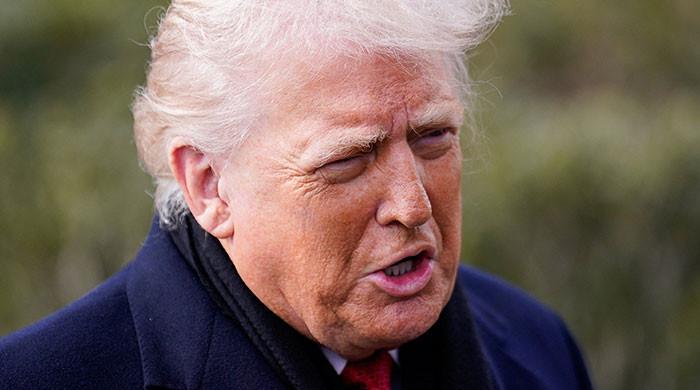
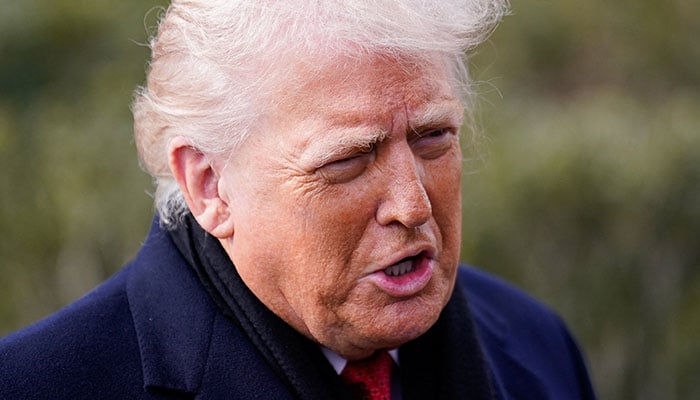
- US lawmakers visit Denmark to back Copenhagen and Greenland.
- Denmark strongly rejects Trump’s takeover idea.
- Lawmakers say most Americans do not support plan.
COPENHAGEN: US President Donald Trump on Friday warned that he could slap tariffs on countries that do not support his Greenland takeover plans, as US Congress members visited Copenhagen to give their backing for Denmark and its autonomous Arctic island.
The bipartisan delegation, on a two-day trip to the Danish capital, said the US president’s long-held territorial ambitions – strongly rejected by Denmark – were not shared by the American people.
Europeans have also been showing their backing for Greenland, in a military reconnaissance mission that a Danish general said Washington was invited to and which was linked to what Russia does after the war in Ukraine.
Trump, again insisting the United States needed mineral-rich Greenland for its “national security”, warned that he “may put a tariff” on countries that oppose that stance.
The 11 visiting US lawmakers held talks with Danish Prime Minister Mette Frederiksen and her Greenlandic counterpart Jens-Frederik Nielsen, as well as Denmark’s foreign and defence ministers, parliamentarians and business leaders.
Republican Senator Lisa Murkowski said there was “good dialogue” and stressed it was important to “nurture” ties between the United States, Denmark and Greenland.
“The vast majority” of Americans do not agree that it is a good idea for the United States to acquire Greenland, she told reporters.
“Greenland needs to be viewed as our ally, not as an asset,” she added.
One idiot
The visit follows a meeting in Washington on Wednesday at which Danish representatives said Copenhagen and Washington were in “fundamental disagreement” over Greenland’s future.
Democratic Senator Chris Coons said the purpose of the Congress members’ visit was to “listen respectfully to our friends, our trusted allies and partners here in Denmark and from Greenland”.
The lawmakers were then to return to the United States “and share those perspectives so that we can lower the temperature and have a more constructive dialogue about the best path forward”, he said.
In Greenland’s capital, Nuuk, residents welcomed the show of support.
“Congress would never approve of a military action in Greenland. It’s just one idiot speaking,” a 39-year-old union representative told AFP.
“If he (Trump) does it, he’ll get impeached or kicked out. If people in Congress want to save their own democracy, they have to step up,” said the union rep, speaking on condition of anonymity.
Demonstrations
Trump has repeatedly criticised Denmark – a NATO ally – for, in his view, not doing enough to ensure Greenland’s security.
The US president has pursued that argument, despite strategically located Greenland – as part of Denmark – being covered by NATO’s security umbrella.
The head of Denmark’s Joint Arctic Command, Major General Soren Andersen, said the United States were invited to the military mission, which he said was “about Russia”.
“When the war in Ukraine is over, hopefully with a good result for Ukraine, it is our expectation that Russia will move the resources they have been using in Ukraine to other theatres, including in the Arctic,” he told AFP.
“So, in order to prepare for that, we simply have to step up, train, and that is what we are doing up here.”
But Andersen said he had not seen any Russian or Chinese combat ships in the area in the two and a half years he has been commander.
Military personnel were more visible in Nuuk on Friday, an AFP journalist said, days after Denmark said it was beefing up its defence on the island.
The White House has said Trump’s aim to take over Greenland would not be affected by the European military presence, which French armed forces minister Alice Rufo said was a sign that the continent was prepared to defend sovereignty.
Britain, Finland, France, Germany, the Netherlands, Norway and Sweden have announced the deployment of small numbers of military personnel to prepare for future exercises in the Arctic.
Large demonstrations are planned across Denmark and Greenland on Saturday to protest against Trump’s plan.
Thousands of people have taken to social networks to say they intend to take part in the protests organised by Greenlandic associations in Nuuk and Copenhagen, Aarhus, Aalborg and Odense.
Politics
Iran protest movement subsides after waves of unrest
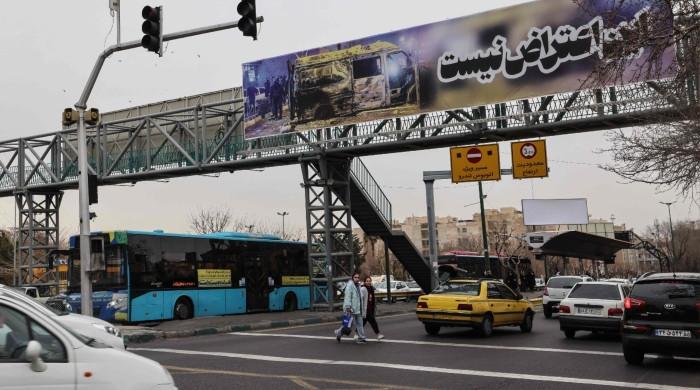
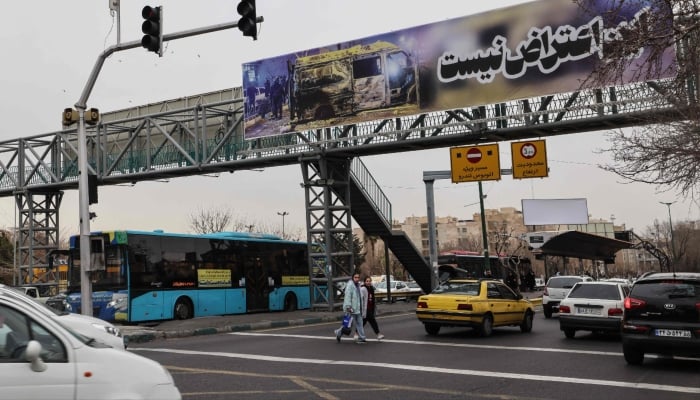
- Reza Pahlavi, son of Iran’s late shah, says govt will fall.
- Netblocks says internet blackout lasted over 180 hours.
- Tasnim reports rioters torched education office in Isfahan.
Tensions in Iran have subsided after three weeks of protests under an internet blackout, monitors said on Friday, a week after the start of the largest demonstrations in years challenging the country’s rulers.
The son of Iran’s late shah, however, said he was confident the government would fall and called for intervention, though the threat of new military action by the United States against Iran has appeared to have receded for the time being.
Protests sparked by economic grievances started with a shutdown in the Tehran bazaar on December 28 but turned into a mass movement demanding the removal of the system that has ruled Iran since the 1979 revolution.
People started pouring into the streets in big cities from January 8, but authorities immediately enforced a shutdown of the internet that has lasted over a week.
Reza Pahlavi, the son of Iran’s late shah, told a news conference in Washington that the government “will fall — not if, but when.”
“I will return to Iran,” he said.
Monitor Netblocks said that the “total internet blackout” in Iran had now lasted over 180 hours, longer than a similar measure that was imposed during the 2019 protests.
Amnesty International said this was being backed up by the use of heavily armed patrols and checkpoints to counter nationwide protests, with security forces visible in the streets.
‘Give Iran a chance’
Trump, who backed and joined Israel’s 12-day war against Iran in June, had not ruled out new military action against Tehran and made clear he was keeping a close eye on if any protesters were executed.
But a senior Saudi official told AFP on Thursday that Saudi Arabia, Qatar and Oman led “a long, frantic, diplomatic last-minute effort to convince President Trump to give Iran a chance to show good intention”.
While Washington appeared to have stepped back, the White House said on Thursday that “all options remain on the table for the president”.
Attention had focused on the fate of a single protester, Erfan Soltani, a 26-year-old who rights activists and Washington said was set to be executed as early as Wednesday.
The Iranian judiciary, however, said Soltani had not been sentenced to death, and his charges meant he did not risk capital punishment.
Rights groups have estimated that up to 20,000 people have been arrested. Security officials cited by the Tasnim news agency on Friday said around 3,000 people were arrested.
‘All Iranians united’
The US Treasury on Thursday announced new sanctions targeting Iranian officials including Ali Larijani, secretary of Iran’s Supreme Council for National Security.
Russian President Vladimir Putin, meanwhile, held telephone talks with Iranian President Masoud Pezeshkian in what the Kremlin described as “efforts to facilitate de-escalation”.
At the UN Security Council in New York, Iranian-American journalist Masih Alinejad, invited to address the body by Washington, said “all Iranians are united” against the government in Iran.
Iran’s representative at the meeting Gholamhossein Darzi accused Washington of “exploitation of peaceful protests for geopolitical purposes.”
There were, however, indications of unrest in some areas.
The state-affiliated Tasnim news outlet reported that rioters set fire to a local education office in Falavarjan County, in central Isfahan Province, on Thursday.
An elderly resident of a town in Iran’s northwestern region, where many Kurdish Iranians live and which has been the focus for many of the biggest flare-ups, said sporadic protests had continued, though not as intensely.
Describing violence earlier in the protests, she said: “I have not seen scenes like that before.”
The state-owned Press TV cited Iran’s police chief as saying calm had been restored across the country.
Tasnim news also reported what it described as the arrest of a large number of leaders of recent riots in the western province of Kermanshah, and the arrest of five people accused of vandalising a gas station and a base belonging to the Basij in the southeastern city of Kerman.
Politics
Modi-led BJP govt under fire for exiting Iran Chabahar port deal after US sanctions
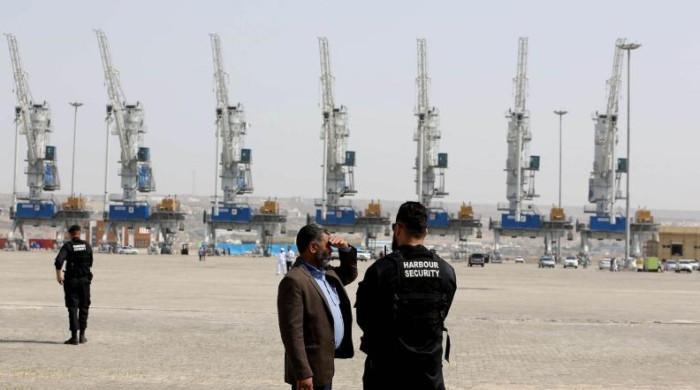
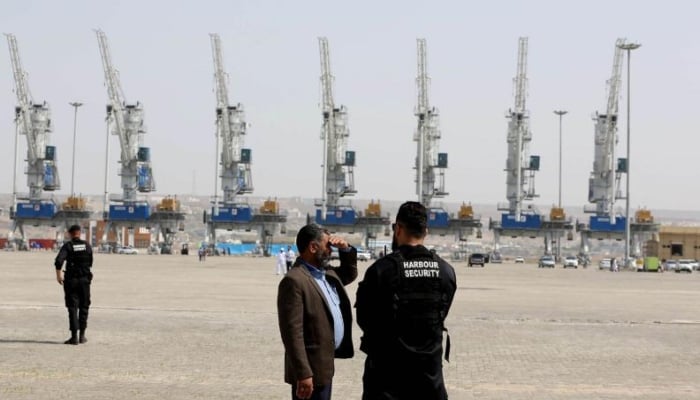
- New Delhi incurs $120m losses after exiting port development deal.
- Congress leader terms move “a new low” in India’s foreign policy.
- Experts say actions raise concerns about India’s role at Chabahar.
The Indian government, led by Prime Minister Narendra Modi, has come under heavy fire at home after it withdrew from the Chabahar port agreement with Iran, with critics arguing the move was a strategic retreat rather than a proactive foreign policy decision.
New Delhi was forced to abandon its involvement in the port after the United States imposed a 25% tariff on countries doing business with Tehran, The Economic Times reported on Thursday.
According to the publication, India’s withdrawal was carried out without any formal announcement, resulting in the loss of $120 million already paid to Iran.
The amount had been transferred before the decision to disengage and is now considered unrecoverable, the report stated.
The state-run company working at the port, India Ports Global Limited (IPGL), saw its board of directors submit collective resignations after the decision, while the company’s official website has also been shut down.
Congress party leader Pawan Khera termed the move “a new low” in the Modi-led government’s foreign policy.
“So the question is not of Chabahar Port or of Russian oil. The question is: Why is Modi allowing USA to arm-twist India?” he asked in an X post.
India assumed responsibility in 2024 for developing Chabahar port under a 10-year arrangement with Iran.
Meanwhile, a foreign journal reported that the $120 million already paid to Iran can now be used by it at its discretion for the port’s construction and development.
Observers described India’s withdrawal from Chabahar port as another major setback for New Delhi.
The Congress party sharply criticised the Modi-led government over the decision, saying the Indian prime minister “has once again surrendered to Trump”.
“$120 million of India’s taxpayers’ money was invested by the Modi government in this strategically important project, but now it’s all gone up in smoke,” read a post on the party’s X handle.
The Indian opposition party recalled Modi hailing the agreement as “a major strategic win”, saying India’s control over the port has been relinquished, with complete silence from the government.
“Unfortunately, Modi has bowed before Trump’s pressure and compromised India’s national interest,” the party stated.
Meanwhile, economic affairs experts believe the latest actions reinforced concerns surrounding India’s role at Chabahar.
They voiced concerns that India was using the port for nefarious objectives, saying that IPGL’s conduct suggested it was created primarily to acquire control of Chabahar.
-

 Tech4 days ago
Tech4 days agoNew Proposed Legislation Would Let Self-Driving Cars Operate in New York State
-

 Sports6 days ago
Sports6 days agoClock is ticking for Frank at Spurs, with dwindling evidence he deserves extra time
-
Sports7 days ago
Commanders go young, promote David Blough to be offensive coordinator
-

 Fashion6 days ago
Fashion6 days agoSouth India cotton yarn gains but market unease over US tariff fears
-

 Fashion6 days ago
Fashion6 days agoChina’s central bank conducts $157-bn outright reverse repo operation
-

 Entertainment3 days ago
Entertainment3 days agoX (formerly Twitter) recovers after brief global outage affects thousands
-

 Sports6 days ago
Sports6 days agoUS figure skating power couple makes history with record breaking seventh national championship
-

 Business7 days ago
Business7 days agoSoftBank reduces Ola Electric stake to 13.5% from 15.6% – The Times of India






